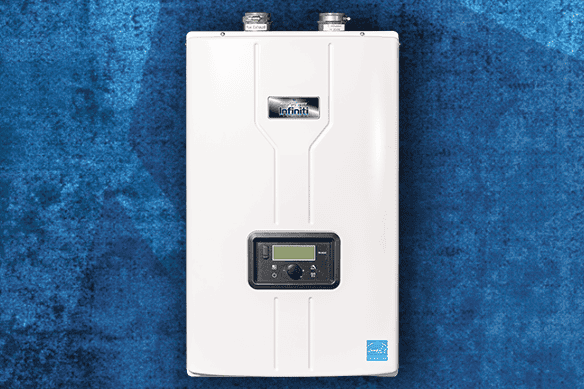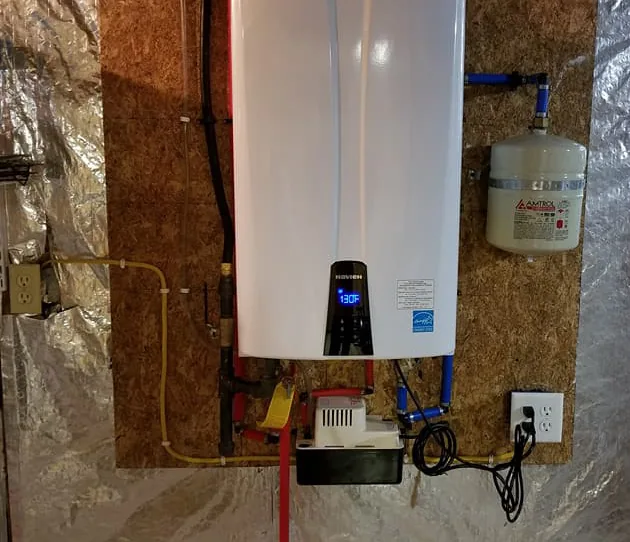Just how do you actually feel when it comes to Pros and Cons of Tankless Water Heater?

In a world where comfort and efficiency preponderate, it's no surprise that house owners are constantly on the lookout for smarter methods to handle their home's power intake and convenience. One innovation that has actually progressively gained popularity is the tankless hot water heater. But just what makes these systems stand apart from the standard tank-based versions most of us grew up with? Let's dive in and check out the advantages of tankless hot water heater, aiding you determine if it's time to make the button in your house.
Introduction
Photo this: you enter the shower after a long day, expecting a relaxing cascade of warm water, just to be welcomed by icy droplets because the last person utilized everything up. Sound familiar? Traditional hot water heater save a fixed quantity of hot water, meaning you go to the mercy of that storage tank's supply. Tankless systems, on the other hand, heat water as needed. Say goodbye to running out mid-shower, say goodbye to wrestling with timetables just to make sure warm water is available.
Recognizing Tankless Water Heaters
What Are Tankless Water Heaters?
Tankless hot water heater, often called on-demand or instant water heaters, give warm water just as it's needed. As opposed to saving gallons of pre-heated water, these units kick into activity the moment you switch on the faucet. Water passes through a warm exchanger, warming up in real-time, implying you obtain an uninterrupted flow of hot water without the requirement for a big tank sitting idly by.
How Do They Differ from Traditional Systems?
Traditional heating units hold a tank of hot water, making use of energy to keep that tank at a regular temperature level. Tankless devices get rid of the standing supply, reducing wasted power and the large footprint of a big cylinder. Basically, you're upgrading from a "accumulation" mindset to a "made-to-order" strategy.
Typical Types of Tankless Devices
Tankless water heaters usually can be found in two ranges: gas and electrical. Gas versions have a tendency to supply higher circulation rates, suitable for larger homes, while electrical models usually serve smaller sized homes and are generally less complicated to install. Furthermore, some systems are created for point-of-use (offering one component) while others can deal with the whole home's warm water demands.
Trick Benefits of Tankless Water Heaters
Energy Efficiency and Expense Cost Savings
Say goodbye to heating up a giant storage tank's worth of water and keeping it cozy all the time. Tankless heating units decrease standby energy losses, which can lower utility costs. While the first price could be greater, the long-lasting cost savings frequently justify the financial investment.
3. Space-Saving Layout
If your home is short on storage space, removing the bulky storage tank liberates useful room. Tankless devices are compact and can frequently be placed on wall surfaces, concealed in edges, or set up in tight utility closets without monopolizing the whole room.
4. Longer Life-span
A well-maintained tankless hot water heater can outlive its tank-based cousin. Standard storage tanks could last 10-15 years, while tankless models can keep chugging along for 20 years or more, making them a strong investment over time.
1. Unlimited Hot Water Supply
Ever before needed to arrange showers so every person obtains their reasonable share of warm water? With tankless, that becomes a thing of the past. As long as the heating unit's flow capability isn't gone beyond, you can take back-to-back showers without developing into a popsicle.
5. Improved Water Quality
Storing water in a tank can sometimes lead to sediment accumulation or a slightly "off" taste. With tankless systems, fresh water is heated instantly, lowering the chances of debris buildup and possibly supplying cleaner-tasting water.
Considerations Prior To Changing
Though the advantages are engaging, it's smart to consider a couple of elements prior to fully devoting.
Assessing Your Home's Water Usage Patterns
If your house concurrently makes use of multiple components with high warm water demand, ensure the unit's flow price fulfills your needs. Understanding your use patterns assists you pick the best dimension and type of tankless heating unit.
Upkeep and Care Tips
Tankless systems are relatively reduced upkeep, but they aren't set-it-and-forget-it home appliances.
Normal Cleansing and Descaling
Hard water minerals can develop in the warm exchanger, influencing efficiency. Regular descaling (typically advised each year) maintains the device going for peak performance.
Yearly Expert Assessments
A yearly checkup from an expert makes certain small problems are captured early. They'll assess the unit's performance, try to find leakages, and assist preserve ideal efficiency.
First Investment Prices
Tankless heaters generally feature a higher ahead of time price tag. In between the unit itself and potential setup alterations, the initial expense could give you sticker shock. But keep in mind to see it as a lasting investment.
Installation Demands
Relying on your home's facilities, you may require extra electric capacity or gas line upgrades. Guarantee you understand the setup needs and speak with a specialist to avoid surprises.
Making Sure Correct Ventilation
For gas versions, proper ventilation is important to safely remove exhaust gases. Make sure airing vent systems are clean and properly set up to avoid any potential safety hazards.
Contrasting Different Brands and Designs
Not all tankless water heaters are developed equal.
Researching Trusted Makers
Look for reputable brand names with a history of creating quality systems. A dependable maker typically gives better client assistance and longer warranties.
Installment: DIY or Professional?
While some house owners delight in tackling tasks themselves, tankless installation could not be the very best time to burst out the toolbox.
Advantages and disadvantages of DIY Installation
A DIY set up might conserve money, however it features risks. Wrong installation can result in inefficiency or security concerns. If you're handy and have experience, it could be feasible-- but wage caution.
Checking Out Evaluations and Individual Responses
User reviews and feedback from neighbors or buddies who have gone tankless can offer valuable insights. Sometimes, real-life experiences can be more informing than advertising and marketing pamphlets.
When to Call an Expert Plumbing Technician
For many, calling a pro ensures every little thing's done appropriately. A professional plumber comprehends local codes, sizing needs, and venting criteria, decreasing the threat of accidents.
Taking full advantage of Performance
You've purchased a tankless device-- currently maximize its effectiveness.
Optimum Temperature Level Settings
Many people set their units between 120-140 F. Changing the temperature can improve comfort and cost savings. Experiment to discover a wonderful area that does not lose power.
Coupling With Low-Flow Fixtures
Intend to extend your system's abilities? Think about mounting low-flow showerheads and taps. They reduce water usage, allowing your tankless system to provide a consistent stream of warm water without stressing.
Ecological Impact
Tankless water heaters align with greener living goals.
Reduced Carbon Impact
By utilizing much less power and just home heating water as required, tankless systems can decrease your home's carbon impact, lowering your environmental impact.
Conserving Natural Resources
Less energy intake and much less thrown away warm water translate into fewer natural resources being used, an ecological win-win.
Who Benefits Most from Tankless Heaters?
The beauty of tankless heating systems is that they can suit a selection of families.
Big Families vs. Single Passengers
Huge families might like the limitless hot water supply, while solitary owners value the energy cost savings from not heating up an entire container for just one person's morning shower.
House Owners with Restricted Area
If your home is short on square video footage, shedding the cumbersome container liberates space for various other fundamentals-- or perhaps just extra elbow room.
Eco-Conscious Consumers
Going tankless aligns with eco-friendly worths, guaranteeing you're not wasting energy or resources.
Future Patterns in Tankless Water Heaters
The world of home appliances is ever-evolving, and tankless water heaters are no exception.
Improvements in Innovation
R&D is frequently improving warm exchangers, making units more efficient and long lasting. Future models may be also quieter, more small, and much better fit for varying environments.
Smart Home Assimilation
Picture readjusting your water heater's temperature level by means of an application or getting upkeep alerts on your phone. As wise home technology developments, we'll see even more connection and convenience.
Final thought
Picking a tankless hot water heater is more than simply upgrading your home's warm water system; it's investing in long-lasting convenience, energy effectiveness, and a greener lifestyle. By considering your home's water use, being mindful of setup needs, and committing to routine maintenance, you can enjoy a consistent stream of warm water without the luggage of a bulky tank. As innovation progresses, you can expect also smarter, more efficient tankless solutions that not only make your life easier but also profit the planet.
5 Benefits of Tankless Water Heaters
Save Valuable Space
Since tankless water heaters do not have a massive 40+ gallon tank of water, they are considerably smaller and can fit in more narrow spaces in your home.
If you are working with limited square footage, a tankless water heater will still provide you with the hot water you need while taking up significantly less space in your home. While the exact size of a tankless water heater varies depending on the brand, some are as small as a carry-on suitcase.
Endless Supply of Hot Water
While a traditional water heater preheats and stores your water in the tank, tankless water heaters do not rely on a reservoir system.
This means that they do not run out of hot water like traditional water heaters since they make hot water as needed. Traditional water heaters need to stop and reheat water when the tank inevitably runs out, but tankless water heaters do not have this issue.
Provide Warm Water On-Demand
As mentioned above, tankless water heaters do not preheat a certain amount of water and then store it in a massive tank to be used later. An advantage of installing a tankless water heater includes water being heated instantly whenever you turn on the faucet.
When you turn on the water, it will travel through a heat exchanger in the unit and be heated with either an electric element or a natural gas burner. Gone are the days of having to ration out your hot water to make sure that you do not run out.
Longer Life Cycle
Not only do tankless water heaters provide an endless supply of hot water for your home whenever you want it, but these units tend to have a longer lifespan than water heaters with tanks.
Tanked water heaters have an average lifespan of around 10 years, as the tank is prone to corrosion, leading to serious issues. In comparison, tankless water heaters can last for around 15 to 20 years with the proper maintenance and tune-ups.
Energy Efficient
Compared to traditional water heaters, tankless water heaters are a more energy-efficient water heating option for your home. Tank water heaters must heat and reheat the water stored in the tank throughout the day, even if you are not home.
This energy use adds up over time, leading to an increase in your energy bills and added strain on your unit. A benefit of buying a tankless water heater includes saving money since it only operates when you turn on the hot water. Since it only heats up as needed, this can decrease your energy bills and save you money in the long run.
https://callrandazzo.com/blog/5-benefits-of-tankless-water-heaters/

As a fervent person who reads on Six Benefits of a Tankless Hot Water Heater, I assumed sharing that excerpt was sensible. Are you aware of anybody else who is interested in Six Benefits of a Tankless Hot Water Heater? Do not hesitate to share it. We appreciate your readership.
See Availability